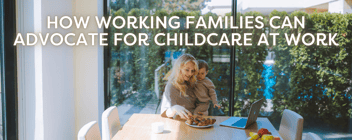Everything You Need to Know About California’s AB 1179
If you’re from California, you may have caught wind of AB 1179, a bill looking to make backup childcare mandatory for large companies. The bill, which was introduced by Assemblywoman Wendy Carillo earlier this year, will amend the Healthy Workplaces, Healthy Families Act of 2014, which currently requires employers to provide employees with paid sick leave.
On the bill’s official website, Carillo notes that while women are essential workers and breadwinners, the Covid-19 pandemic still disproportionately impacted them, particularly women of color. This and other inequities exposed by the pandemic showed millions of Californians that workers were in desperate need of better childcare assistance.
Even though the bill has not yet been passed, if you’re a company owner or HR leader in California, you’re wondering what exactly AB 1179 does, what it requires, and from who. These are great questions, and we’ve got the answers.
What is Assembly Bill 1179 (AB 1179)?
AB 1179 is a labor and employment bill that was introduced to the assembly on February 18, 2021. It will require large employers to provide subsidized backup childcare, sometimes called emergency backup childcare, as a direct benefit to employees.
What is Backup Childcare Benefits?
Backup childcare employee benefits are benefits that pay for an employee’s backup childcare when their regular childcare arrangement falls through. For example, if the child becomes sick and can’t go to their normal childcare center, backup care benefits can be used for a backup babysitter to provide home care.
Paid backup childcare benefits are not the same as childcare leave, which is a leave benefit that employees can use to leave work for childcare-related reasons.
Who does AB 1179 Apply to?
AB 1179 applies only to “employers” as the term is defined in the bill. According to the bill, “employer” includes employers with 1,000 employees or more, and also the state government, political subdivisions of the state, and municipalities, including charter cities.
You can find the full definition of “employer” under Section 2, Article 6, 2951(c).
How Much Backup Childcare is required under AB 1179?
The bill requires employers to provide employees with one hour of backup childcare for every 34 hours worked. Employers may choose a different accrual method, so long as employees are able to accrue 60 hours of backup childcare benefits by the 200th calendar day of the year, every calendar year, or in each 12-month period.
For Salaried Employees
Salaried employees are deemed to work 40 hours per week unless the employee’s normal workweek is less than 40 hours. If this is the case, then employees must be able to accrue backup care based on that normal workweek.
Accrual Begins When...
Accrual begins at the “commencement of employment.” However, employees must work for 30 or more days within a year to be eligible for backup care benefits.
How Much Will Mandatory Backup Childcare Cost Employers?
Direct Costs
How much it will cost to fund this new benefit has been a concern for many companies. Up-front costs will vary depending on the backup care provider, the size of your company, and usage rates among employees.
Want a Backup Childcare Quote for your Company? Contact Us
Indirect Costs… Or Savings?
Although childcare benefits will have a direct cost on employers, experts find that backup care benefits will also help companies save money by reducing other costs associated with an employee’s lack of childcare.
Costs that can be lowered or eliminated include costs associated with drops in productivity, replacement efforts for employees who have to miss work due to family care, and recruitment efforts to replace employees who exit.
What is a Qualified Backup Childcare Provider?
Under AB 1179, to be a qualified backup childcare provider, the provider has to be either a childcare provider licensed by the State Department of Social Services or a license-exempt provider as defined in Section 1596.60 of the Health and Safety Code (HSC).
HSC defines a license-exempt childcare provider as a “person 18 years of age or older who provides childcare, supervision, or any person providing in-home educational or counseling services to a minor, and who is not required to be licensed pursuant to Section 1596.792.”
AB 1179 Compliant Benefits Solutions
At Helpr, we provide backup childcare benefits solutions compliant with AB 1179.




